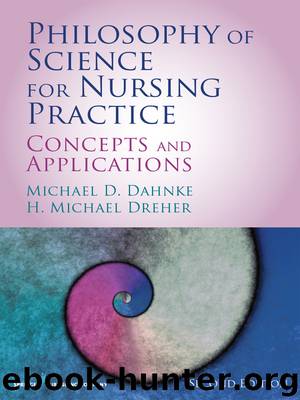Philosophy of Science for Nursing Practice, Second Edition by Michael D. Dahnke PhD H. Michael Dreher PhD RN FAAN

Author:Michael D. Dahnke, PhD,H. Michael Dreher, PhD, RN, FAAN
Language: eng
Format: epub
Publisher: Springer Publishing Company, Inc.
Published: 2015-10-30T10:50:00+00:00
Of course, Kuhn’s inability to deny the “Yes” answer may reflect no more than a constitutional weakness, an inability to accept an unwanted but logically inferred conclusion. He also notes the lack of (or even possibility of) a neutral observation language. Thus, his affirmation of the answer from three centuries of philosophy may not be warranted.
Remember that Kuhn understood two types of science. Normal science was the focus of the previous paragraph. He also wrote of revolutionary science that occurs at periods of paradigm shifts, periods during which fundamental views and beliefs about the world change. One thing we might say is that paradigm shifts indicate that although our observations are theory-laden (or paradigm-laden), such influences on our perception are not immutable. The piles are driven deep but can be extracted. Kuhn referred to a psychological experiment by Bruner and Postman in which subjects are shown individual playing cards (Kuhn, 1962, pp. 62–63, 112–113). However, some of the cards are anomalous; that is, they are red spades or black hearts. At first subjects do not note anything unusual about the anomalous cards. They see the red spades as hearts or the black hearts as spades. As the experiment continues the subjects are shown the cards for greater periods of time. Eventually, most of the subjects begin to recognize the anomalous cards as anomalous. What this study seems to indicate on a small scale is that even though our perception is influenced by theory and background knowledge, such influence can be overcome to bring out a new way of perceiving the world. For a larger scale, science-oriented example, Kuhn noted that after Sir William Herschel discovered the planet Uranus where others had only seen stars, astronomers were “prepared to find additional planets” (1962, p. 116). Beliefs about that part of the sky kept many astronomers from seeing planets. Herschel was able to see past those prejudices, to see in a different way. Once he did, others were able to follow him. Yet we cannot privilege this new way of seeing the world, of seeing planets where previously others had seen only stars, as “fixed and neutral,” as merely the world as it is without prejudice or theory-ladenness. No such way of seeing the world has been established. No observation language has been established as such. No paradigm presents a world to us in as brute and unproblematic a manner. In Kuhn’s words, “It is hard to make nature fit a paradigm” (1962, p. 135). To think that it would fit a paradigm seems perhaps presumptuous; to assume that what is in one’s head clearly and without distortion reflects what exists in the world. “That is why,” according to Kuhn, “the puzzles of normal science are so challenging and also why measurements undertaken without a paradigm so seldom lead to any conclusions at all” (1962, p. 135). This ability to shift paradigm, to change one’s long held, deeply cherished views of the world allows for some measure of objectivity. As wedded as
Download
This site does not store any files on its server. We only index and link to content provided by other sites. Please contact the content providers to delete copyright contents if any and email us, we'll remove relevant links or contents immediately.
| Administration & Medicine Economics | Allied Health Professions |
| Basic Sciences | Dentistry |
| History | Medical Informatics |
| Medicine | Nursing |
| Pharmacology | Psychology |
| Research | Veterinary Medicine |
The Daughter's Return by The Daughter's Return(1792)
Elizabeth Is Missing by Emma Healey(1659)
1610396766 (N) by Jo Ann Jenkins(1658)
Economics and Financial Management for Nurses and Nurse Leaders, Third Edition by Susan J. Penner RN MN MPA DrPH CNL(1508)
McGraw-Hill Nurses Drug Handbook by Patricia Schull(1488)
Home. by Sarah Graham(1426)
Cherry Ames Boxed Set, Books 1 - 4 by Helen Wells(1421)
NCLEX-RN Prep Plus 2019 by Kaplan Nursing(1403)
The Language of Kindness by Christie Watson(1375)
Spiritual Midwifery by Ina May Gaskin(1363)
Cherry Ames, Student Nurse by Helen Wells(1361)
NCLEX-RN Prep 2019 by Kaplan Nursing(1354)
Cherry Ames Boxed Set, Books 5 - 8 by Helen Wells(1337)
Whoever Tells the Best Story Wins: How to Use Your Own Stories to Communicate with Power and Impact by Annette Simmons(1297)
Cracking the Nursing Interview by Jim Keogh(1292)
1476763445 by Liz Fenton(1255)
Global Diversity Management by Unknown(1245)
Getting Started with Arduino by Massimo Banzi(1230)
Dementia by June Andrews(1207)
